- Home
- Raymond E. Feist
Krondor Tear of the Gods
Krondor Tear of the Gods Read online
Krondor
Tear of the Gods
The Riftwar Legacy
Book III
Raymond E. Feist
CONTENT
PROLOGUE Attack
ONE Arrival
TWO Schemes
THREE Vow
FOUR Secrets
FIVE Monsters
SIX Intrigues
SEVEN Conspiracy
EIGHT Kendaric
NINE Diversion
TEN Goblins
ELEVEN Haldon Head
TWELVE Dark Magic
THIRTEEN Misdirection
FOURTEEN Vampire
FIFTEEN Two Fangs
SIXTEEN Temple
SEVENTEEN Black Pearl
EIGHTEEN Tear of the Gods
EPILOGUE Challenge
PROLOGUE
Attack
The weather worsened.
Dark clouds roiled overhead as angry lightning flashed, piercing the night’s blackness on all quarters. The lookout atop the highest mast of the ship Ishap’s Dawn thought he saw a flicker of movement in the distance and squinted against the murk. He tried to use his hand to shield his eyes as the salt spray and biting cold wind filled them with tears. He blinked them away and whatever movement he thought he had seen was gone.
Night and the threat of storms had forced the lookout to spend a miserable watch aloft, against the unlikely chance the captain had drifted off course. It was hardly possible, considered the lookout, as the captain was a knowledgeable seaman, chosen for his skill at avoiding danger as much as any other quality. And he knew as well as any man how hazardous this passage was. The Temple held the cargo’s value second to none, and rumors of possible raiders along the Quegan coast had dictated a hazardous tack near Widow’s Point, a rocky area best avoided if possible. But Ishap’s Dawn was crewed by experienced sailors, who were now closely attentive to the captain’s orders, and each was quick to respond, for every man aloft knew that, once upon the rocks at Widow’s Point, no ship survived. Each man feared for his own life - that was only natural - but these men were chosen not only for their seamanship, but also for fealty to the Temple. And they all knew how precious their cargo was to the Temple.
In the hold below, eight monks of the Temple of Ishap in Krondor stood around a most holy artifact, the Tear of the Gods. A jewel of astonishing size, easily as long as a large man’s arm and twice as thick, it was illuminated from within by a mystic light. Once every ten years a new Tear was formed in a hidden monastery in a tiny secret valley in the Grey Tower Mountains. When it was ready and most holy rites completed, a heavily armed caravan transported it to the nearest port in the Free Cities of Natal. There it was placed upon a ship and carried to Krondor. From there, the Tear and an escort of warrior monks, priests, and servants would continue on, eventually reaching Salador to then be taken by ship and transported to the mother Temple in Rillanon where it replaced the previous Tear, as its power waned.
The true nature and purpose of the sacred gem was known only to the highest ranking among those serving within the Temple, and the sailor high atop the main mast asked no questions. He trusted in the power of the gods and knew that he served a greater good. And he was being handsomely paid not to ask questions as much as to stand his watch.
But after two weeks of battling contrary winds and difficult seas, even the most pious man found the blue-white light which shone every night from below, and the monks’ incessant chanting, nerve-wracking. The duration of the unseasonable winds and unexpected storms had some of the crew muttering about sorcery and dark magic. The lookout offered a silent prayer of thanks to Killian, Goddess of Nature and Sailors (and then added a short one to Eortis, who some said was the true God of the Sea) that come dawn they would reach their destination: Krondor. The Tear and its escort would quickly leave the city for the east, but the sailor would remain in Krondor, with his family. What he was being paid would allow him a long visit home.
The sailor above thought of his wife and two children, and he smiled briefly. His daughter was now old enough to help her mother around the kitchen and with her baby brother, and a third child was due soon. As he had a hundred times before, the sailor vowed he’d find other work near home, so he could spend more time with his family.
He was pulled from his reverie by another flicker of movement toward shore. Light from the ship painted the storm-tossed combers and he could sense the rhythm of the sea. Something had just broken the rhythm. He peered through the murk, trying to pierce the gloom by strength of will, to see if they might be drifting too close to the rocks.
Knute said, “The blue light coming from that ship gives me a bad feeling, Captain.”
The man Knute addressed towered over him as he looked down. At six foot eight inches tall he dwarfed those around him. His massive shoulders and arms lay exposed by the black leather cuirass he favored, though he had added a pair of shoulder pads studded with steel spikes - a prize taken off the corpse of one of Queg’s more renowned gladiators. The exposed skin displayed dozens of reminders of battles fought, traces of old wounds intersecting one another. A scar that ran from forehead to jawbone through his right eye, which was milky white, marked his face. But his left seemed to glow with an evil red light from within and Knute knew that eye missed little.
Save for the spikes on his shoulders, his armor was plain and serviceable, well oiled and cared for, but displaying patches and repairs. An amulet hung around his neck, bronze but darkened by more than time and neglect, stained by ancient and black arts. The red gem set in its middle pulsed with a faint inner light of its own as Bear said, “Worry about keeping us off the rocks, pilot. It’s the only reason I keep you alive.” Turning to the rear of the ship, he spoke softly, but his voice carried to the stern. “Now!”
A sailor at the rear spoke down to those in the hold below, “Forward!” and the hortator raised one hand, and then brought its heel down on the drum between his knees.
At the sound of the first beat, the slaves chained to their seats raised their oars and on the second beat they lowered them and pulled as one. The word had been passed, but the Master of Slaves who walked between the banks of oars repeated it. “Silently, my darlings! I’ll kill the first of you who makes a sound above a whisper!”
The ship, a Quegan patrol galley seized in a raid the year before, inched forward, picking up speed. At the prow, Knute crouched, intently scanning the water before him. He had positioned the ship so it would come straight at the target, but there was one turn that still needed to be made to port - not difficult if one reckoned the timing correctly, but dangerous nevertheless. Suddenly Knute turned and said, “Now, hard to port!”
Bear turned and relayed the order and the helmsman turned the ship. A moment later Knute ordered the rudder amidships, and the galley began to cut through the water.
Knute’s gaze lingered on Bear for a moment, and then he returned his attention to the ship they were about to take. Knute had never been so frightened in his life. He was a born pirate, a dock-rat from Port Natal who had worked his way up from being an ordinary seaman to being one of the best pilots in the Bitter Sea. He knew every rock, shoal, reef, and tide pool between Ylith and Krondor, and westward to the Straits of Darkness, and along the coast of the Free Cities. And it was that knowledge that had kept him alive more than forty years while braver, stronger, and more intelligent men had died.
Knute felt Bear standing behind him. He had worked for the enormous pirate before, once taking Quegan prize ships as they returned from raids along the Keshian coast. Another time he had served with Bear as a privateer, under marque from the Governor of Durbin, plundering Kingdom ships.
For the last four years Knute had run his own
gang, scavengers picking over wrecks drawn upon the rocks by false lights here at Widow’s Point. It had been the knowledge of the rocks and how to negotiate them that had brought him back into Bear’s service. The odd trader named Sidi, who came to the Widow’s Point area every year or so, had asked him to find a ruthless man, one who would not shirk from a dangerous mission and who had no aversion to killing. Knute had spent a year tracking down Bear and had sent him word that there was a job of great risk and greater reward waiting. Bear had answered and had come to meet with Sidi. Knute had figured he’d either take a fee for putting the two men in touch, or he might work a split with Bear in exchange for use of his men and his ship. But from that point where Knute had brought Bear to meet with Sidi, on the beach at Widow’s Point, everything had changed. Instead of working for himself, Knute was now again working as Bear’s galley-pilot and first mate - Knute’s own ship, a nimble little coaster, had been sunk to drive home Bear’s terms: riches to Knute and his men if they joined him. If they refused, the alternative was simple: death.
Knute glanced at the strange blue light dancing upon the water as they drew down upon the Ishapian ship. The little man’s heart beat with enough force to make him fear it would somehow break loose from within. He gripped the wooden rail tightly as he called for a meaningless course correction; the need to shout diverted into a sharp command.
Knute knew he was likely to die tonight. Since Bear had expropriated Knute’s crew, it had simply been a matter of time. The man Knute had known along the Keshian coast had been bad enough, but something had changed Bear, made him far blacker a soul than before. He had always been a man of few scruples, but there had been an economy in his business, a reluctance to waste time with needless killing and destruction, even if he was otherwise unfazed by it. Now Bear seemed to relish it. Two men in Knute’s crew had died lingering, painful deaths for minor transgressions. Bear had watched until they had died. The gem in his amulet had shone brightly then, and Bear’s one good eye seemed alight with the same fire.
Bear had made one thing clear above all else: this mission’s goal was to take a holy relic from the Ishapians and any man who interfered with that mission would die. But he had also promised that the crew could keep all the rest of the Ishapian treasure for themselves.
When he heard that, Knute had begun to make a plan.
Knute had insisted upon several practice sorties, claiming that the tides and rocks here were treacherous enough in the daylight - at night a thousand calamities could befall the unprepared. Bear had grudgingly acquiesced to the plea. What Knute had hoped would happen did: the crew learned to take orders from him once Bear gave over command of the ship. Bear’s crew was made up of thugs, bullies, and murderers, including one cannibal, but they weren’t terribly intelligent.
Knute’s was a daring plan, and dangerous, and he needed more than a little luck. He glanced back and saw Bear’s eyes fixed on the blue light of the Ishapian ship as they bore down on it. One quick glance from face to face of his own six men was all Knute could afford, and then he turned back to the Ishapian ship.
He gauged his distance and the motion, then turned and shouted past Bear, “One point to port! Ramming speed!”
Bear echoed the command, “Ramming speed!” Then he shouted, “Catapults! Ready!”
Flames appeared as torches were quickly lit, and then those torches were put to large bundles of skins full of Quegan Fire oil. They burst into flame and the catapult officer shouted, “Ready, Captain!”
Bear’s deep voice rumbled as he gave the order: “Fire!”
The lookout squinted against the wind-driven salt spray. He was certain he saw something shoreward. Suddenly a flame appeared. Then a second. For a moment size and distance were difficult to judge, but the sailor quickly realized with a surge of fear that two large balls of fire sped toward the ship.
Angry orange-red flames sizzled and cracked as the first missile arced overhead, missing the lookout by mere yards. As the fireball shot past, he could feel the searing heat.
“Attack!” he shouted at the top of his lungs. He knew full well the entire night watch had seen the fiery missiles; nonetheless it was his task to alert the crew.
The second fireball struck mid-decks, hitting the com-panionway that ran from below to the foredeck, and an unfortunate priest of Ishap was consumed in the sticky flames. He screamed in agony and confusion as he died.
The sailor knew that if they were being boarded, staying aloft was not a good idea. He swung from the crow’s nest and slid down a stay sheet to the deck below as another ball of flame appeared in the sky, arcing down to strike the foredeck.
As his bare feet touched the wooden planks, another sailor who shouted, “Quegan raiders!” handed him a sword and buckler shield.
The thudding of a hortator’s drum echoed across the waves. Suddenly the night came alive with noise and cries.
From out of the gloom a ship reared, lifted high by a huge swell, and the two sailors could see the massive serrated iron ram extending from the galley’s prow. Once it slammed into its victim’s hull, its teeth would hold the rammed ship close, until the signal was given for the galley slaves to reverse their stroke. By backing water, the galley would tear a massive hole in Ishap’s Dawn’s side, quickly sending her to the bottom.
For an instant the lookout feared he would never see his children or wife again, and hastily uttered a prayer to whatever gods listened that his family be cared for. Then he resolved to fight, for if the sailors could hold the raiders at the gunwale until the priests emerged from below, their magic might drive off the attackers.
The ship heaved and the sound of tearing wood and shrieking men filled the night as the raider crashed into the Ishapian ship. The lookout and his companions were thrown to the deck.
As the lookout rolled away from the spreading fire, he saw two hands gripping the ship’s gunwale. The lookout gained his feet as a dark-skinned pirate cleared the side of the ship, and boarded with a leap to the deck, others following.
The first pirate carried a huge sword, curved and weighted, and he grinned like a man possessed. The lookout hurried toward him, his sword and shield at the ready. The pirate’s hair hung in oiled locks that glistened in the light from the flames. His wide eyes reflected the orange firelight, which gave him a demonic cast. Then he smiled and the lookout faltered, as the filed pointed teeth revealed the man to be a cannibal from the Shaskahan Islands.
Then the lookout’s eyes widened as he saw another figure rear up behind the first.
It was the last thing the lookout saw, as the first pirate swung his sword and impaled the hapless man, who stood rooted in terror at the sight before him. With his dying breath, he gasped, “Bear.”
Bear glanced around the deck. Massive hands flexed in anticipation as he spoke. His voice seemed to rumble from deep within as he said, “You know what I’m after; everything else is yours for the taking!”
Knute leaped from the raider’s craft to stand at Bear’s side. “We hit ‘em hard, so you don’t have much time!” he shouted to the crew. As Knute had hoped, Bear’s men rushed to kill the Ishapian sailors, while Knute signaled to the handful from his old crew, who headed toward the hatches and the cargo nets.
An Ishapian monk, climbing up the aft companionway to answer the alarm, saw the pirates spreading out in a half-circle around him. His brothers followed after. For a moment, both sides stood motionless, as they measured one another.
Bear stepped forward and in a voice like grinding stones said to the first monk, “You there! Bring me the Tear and I’ll kill you quickly.”
The monk’s hands came up and moved rapidly in a mystic pattern while enchanting a prayer to summon magic. The other monks took up fighting stances behind him.
A bolt of white energy flashed at Bear, but vanished harmlessly just inches before him as the ship heeled over and started to dip at the bow. With a scornful laugh, Bear said, “Your magic means nothing to me!”
With surprisi
ng speed for a man his size, Bear lashed out with his sword. The monk, still recovering from the shock of his magic’s impotence, stood helpless as Bear ran him through as if cutting a melon with a kitchen knife. The pirates let loose a roar of triumph and fell upon the other monks.
The monks, though empty-handed and outnumbered, were all trained in the art of open-handed fighting. In the end they could not stand up to pole weapons and swords, knives and crossbows, but they delayed the pirates long enough that the forecastle was already underwater before Bear could reach the companionway leading below decks.
Like a rat through a sewer grating, Knute was past Bear and down the companionway. Bear came second, the others behind.
“We’ve got no time!” shouted Knute, looking around the aft crew quarters; from the abundant religious items in view, he judged this area had been given over to the monks for their personal use. Knute could hear water rushing into the hole below the forecastle. Knute knew ships; eventually a bulkhead between the forecastle and the main cargo hold would give way and then the ship would go down like a rock.
A small wooden chest sitting in the corner caught his eye and he made straight for it, while Bear moved to a large door that led back to the captain’s cabin. Movement was becoming more difficult as the deck was now tilting, and walking up its slick surface was tricky. More than one pirate fell, landing hard upon the wooden planks.
Knute opened the small chest, revealing enough gems to keep him in luxury for the rest of his life. Like moths to a flame, several raiders turned toward the booty. Knute motioned to two other pirates close by and said, “If you want a copper for all this slaughter, get up on deck, help open the hatch, and lower the cargo net!”
Both men hesitated, then looked to where Bear struggled to open the door. They glanced at one another, then did as Knute instructed. Knute knew they would find two of his men already at the hatch and would fall in to help. If Knute’s plan were to work, everyone would have to do his part without realizing that the order of things on the ship had changed.

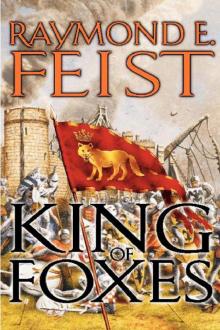 King of Foxes
King of Foxes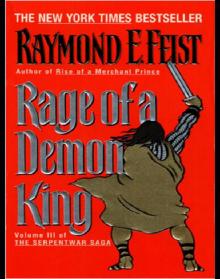 Rage of a Demon King
Rage of a Demon King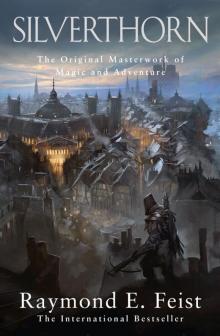 Silverthorn
Silverthorn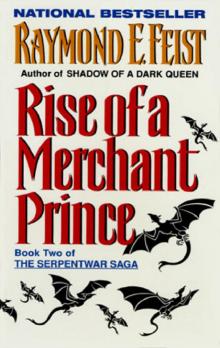 Rise of a Merchant Prince
Rise of a Merchant Prince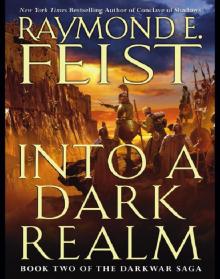 Into a Dark Realm: Book Two of the Darkwar Saga
Into a Dark Realm: Book Two of the Darkwar Saga Shadow of a Dark Queen
Shadow of a Dark Queen A Kingdom Besieged
A Kingdom Besieged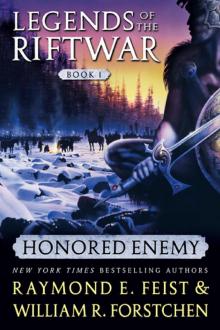 Honored Enemy
Honored Enemy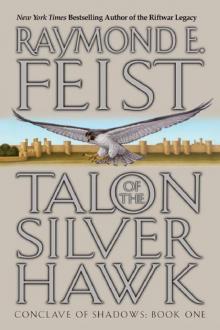 Talon of the Silver Hawk
Talon of the Silver Hawk The Complete Legends of the Riftwar Trilogy
The Complete Legends of the Riftwar Trilogy Exile's Return: Conclave of Shadows: Book Three
Exile's Return: Conclave of Shadows: Book Three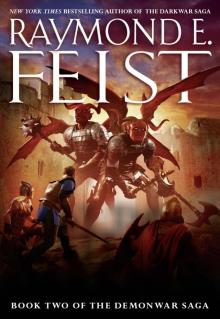 At the Gates of Darkness
At the Gates of Darkness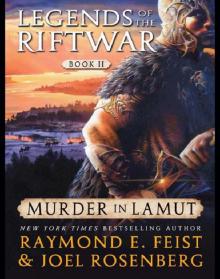 Murder in LaMut: Legends of the Riftwar: Book II
Murder in LaMut: Legends of the Riftwar: Book II The King's Buccaneer
The King's Buccaneer Flight of the Nighthawks
Flight of the Nighthawks The Riftwar Saga
The Riftwar Saga A Darkness at Sethanon
A Darkness at Sethanon Magician: Master
Magician: Master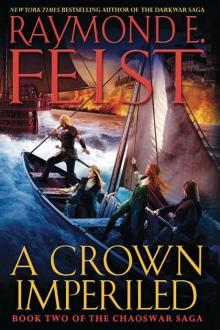 A Crown Imperiled
A Crown Imperiled Magician: Apprentice
Magician: Apprentice Midkemia
Midkemia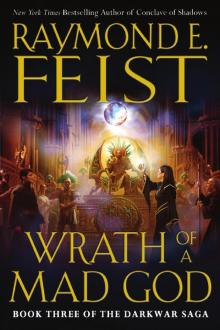 Wrath of a Mad God
Wrath of a Mad God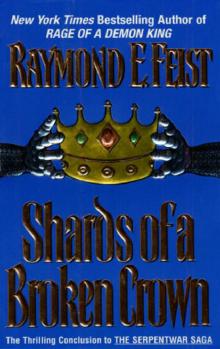 Shards of a Broken Crown
Shards of a Broken Crown Magician's End
Magician's End King of Ashes
King of Ashes Jimmy and the Crawler
Jimmy and the Crawler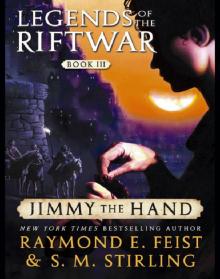 Jimmy the Hand: Legends of the Riftwar, Book 3
Jimmy the Hand: Legends of the Riftwar, Book 3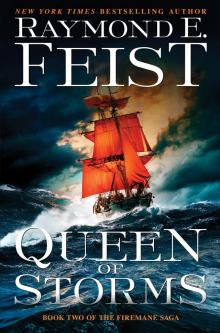 Queen of Storms
Queen of Storms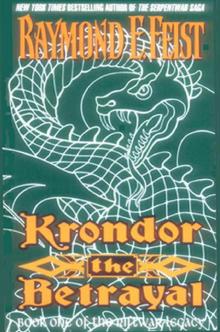 Krondor: The Betrayal
Krondor: The Betrayal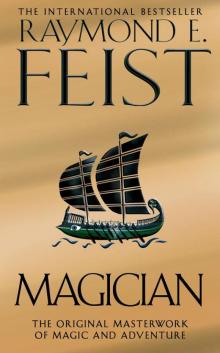 Magician
Magician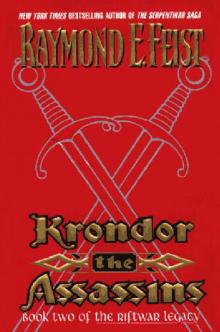 Krondor: The Assassins
Krondor: The Assassins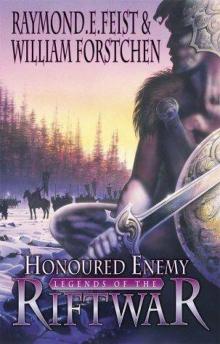 Honoured Enemy
Honoured Enemy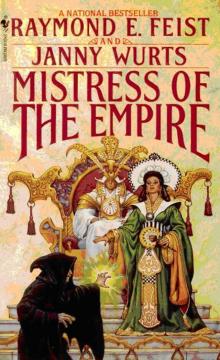 Mistress of the Empire
Mistress of the Empire The Complete Empire Trilogy
The Complete Empire Trilogy Legends 1 - Honoured Enemy
Legends 1 - Honoured Enemy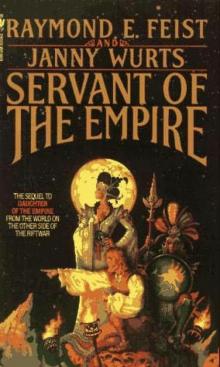 Empire - 02 - Servant Of The Empire
Empire - 02 - Servant Of The Empire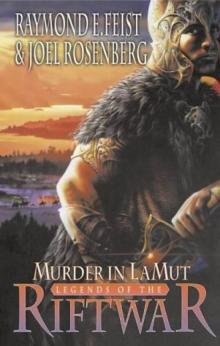 Murder In LaMut
Murder In LaMut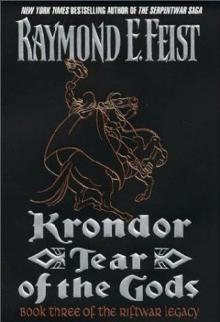 Krondor Tear of the Gods
Krondor Tear of the Gods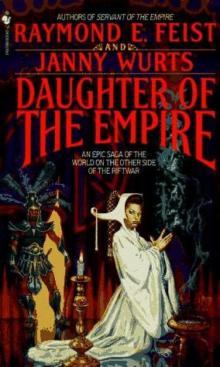 Empire - 01 - Daughter Of The Empire
Empire - 01 - Daughter Of The Empire![King of Ashes [Book One] Read online](http://i1.bookreadfree.com/i1/03/30/king_of_ashes_book_one_preview.jpg) King of Ashes [Book One]
King of Ashes [Book One]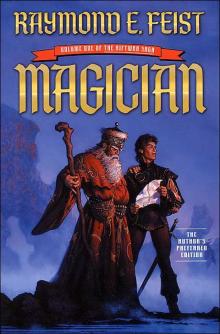 Magician (10th Aniversary Edition)
Magician (10th Aniversary Edition) Prince of the Blood, the King's Buccaneer
Prince of the Blood, the King's Buccaneer A Crown Imperilled cs-2
A Crown Imperilled cs-2 Exile's Return
Exile's Return Jimmy the Hand
Jimmy the Hand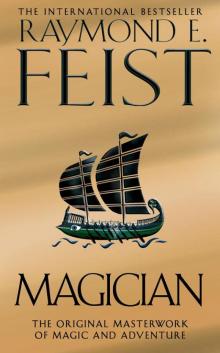 Book 1 - Magician
Book 1 - Magician Empire - 03 - Mistress Of The Empire
Empire - 03 - Mistress Of The Empire Darkness at Sethanon
Darkness at Sethanon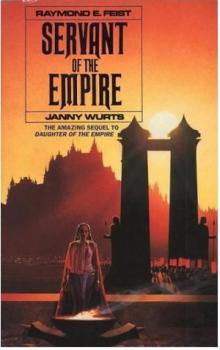 Servant of the Empire
Servant of the Empire A Crown Imperilled
A Crown Imperilled Rides a Dread Legion
Rides a Dread Legion Legends of the Riftwar
Legends of the Riftwar Daughter of the Empire
Daughter of the Empire The Riftwar Saga Trilogy: Magician, Silverthorn and A Darkness at Sethanon
The Riftwar Saga Trilogy: Magician, Silverthorn and A Darkness at Sethanon